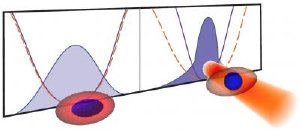Sep 28 2009
Physicists are continually reaching new lows as they reduce the temperatures of samples in their laboratories. But even nano-kelvins are not low enough to overcome the entropy (a measure of the disorder in a system) that stands between them and the discovery of exotic states of ultra-cold matter. Now physicists at two Italian universities have developed a technique that siphons entropy out of a collection of atoms in much the same way that a kitchen refrigerator removes heat from the food stored inside. The new method is described in Physical Review Letters and highlighted in the September 28 issue of Physics.
 In a cloud of cold gases (left) entropy can be reduced (right) by focusing a laser that compresses one component (blue) without affecting the other (red). Rather than heating up the blue component, some of the disorder in the squeezed gas moves to the surrounding gas cloud. Credit: J. Catani et al., Phys. Rev. Lett. 103, 140401 (2009)
In a cloud of cold gases (left) entropy can be reduced (right) by focusing a laser that compresses one component (blue) without affecting the other (red). Rather than heating up the blue component, some of the disorder in the squeezed gas moves to the surrounding gas cloud. Credit: J. Catani et al., Phys. Rev. Lett. 103, 140401 (2009)
The system that Jacopo Catani (University of Florence) and colleagues assembled begins with a cloud of potassium and rubidium atoms held in a magnetic trap. They selected a laser with a wavelength of light that interacted with the potassium atoms, but had little effect on the rubidium atoms. They then compressed the potassium atom cloud by focusing the laser to a point in the trap. Compressing a gas usually increases its temperature, but the surrounding rubidium kept things in check, allowing the researchers to hold the temperature roughly constant as entropy was shifted from the potassium to the rubidium atoms.
The novel technique should work with other combinations of atoms as well, offering researchers a new tool to aid them in their pursuit of physics at ultra-low temperatures and entropies.